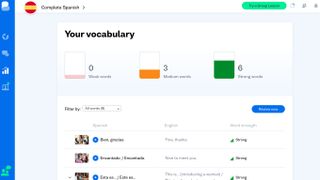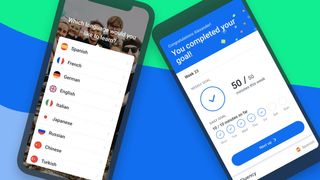Busuu, one of the newer names in language learning, offers courses in Arabic, Chinese, French, German, Italian, Japanese, Polish, Portuguese, Russian, Spanish and Turkish – a limited selection compared to market-leaders such as Rosetta Stone and Duolingo – but one that covers the most popular languages studied by English-speakers.
Once a language has been chosen, the Busuu white and blue interface is light, simple and easy to navigate – with free and premium services on offer. The free – or ‘basic’ – service allows you to learn one chosen language. Beginners are eased into the lessons through exercises around commonly used words and basic interactions, such as ‘hello, nice to meet you’. The lessons become more comprehensive as they go on, with a focus developing on grammar and deeper conversational skills. These reach up to an advanced intermediate level.
While this learning app has made it onto both of our lists for the best learn Spanish online courses and best learn French online apps, it hasn't topped either of those guides. Below, we've outlined exactly why we don't think it deserves the highest spot.
Teaching method
Busuu sets out a clear course structure from the beginning, allowing the user to follow precisely where they are in their language-learning journey. The content of each lesson is displayed clearly before you embark on it, and each lesson is a natural continuation from the previous one. This well-structured organization means the user is always building on the last lesson and continuing to practice what has been learned already as they expand into the next section.
While the lessons are not as intense as the Rosetta Stone courses, they are comprehensive. Exercises include listening to audio clips, watching video interactions, writing down words, repeating spoken phrases and completing drag and drop vocabulary tests to create sentences – all of which help the user retain information. These exercises tend to be repetitive without being exhaustive, and you can study and absorb the vocabulary without getting frustrated or bored.

The written element is particularly useful for learning the spelling of words, which are often spelt with accents or diacritical marks. Post-lesson summaries allow you to see where you might be struggling or making the same mistake and give you the option of returning to practise your ‘weak words’. Each time you finish a lesson, it is marked as complete, although all lessons can be revised at any time before moving on. This is ideal if you wish to spend more time on that particular topic.
As with many language courses, the four stages of learning are Beginner (B1), Elementary (A2), Intermediate (B1) and Upper Intermediate (B2). The latter is handy for advanced users who are looking for a grammatical refresher, however, it's likely to be unsatisfying for anyone who is looking for more professional skills. At the end of each stage, you will take a review lesson, which is essentially a mock test. Premium users are able to take a full test which earns you an official McGraw-Hill, educational publisher, certificate.

Pricing
Busuu offers three levels of service: free, premium and premium plus. Unlike Duolingo’s complimentary service, which is wide-ranging and comprehensive, there are noticeable limitations on Busuu’s free courses. The basic service allows you to learn just one language and the official McGraw-Hill testing at the end of each level is not available. While vocabulary can be learned using the flashcard method through the basic service, premium users have access to more diverse methods of learning such as grammar-specific exercises. They can also tap into Busuu’s online community of users, interacting with other language students within the app.

Perhaps one of the most beneficial features with both premium packages is the ability to download lessons to your devices. This is a huge plus to anyone who wishes to learn on the move; especially while commuting, on a long-haul flight or when travelling without Wi-fi access.
Prices start at $6.67 per month for Premium and $7.50 per month for Premium Plus, although this is billed annually so you'll pay $80.04 or $90 in total. If opting for either premium package, users should be aware that Busuu automatically bills annually, so it is essential to cancel your subscription if you are no longer using the premium service.
Additional tools
Busuu offers several additional features across the platform, such as group tutorials and live lessons with professionals. These are available if using the paid-for premium service. Live lessons are also occasionally offered to users as the result of a competition, such as a prize draw.
Another common premium feature is that the platform will ask someone who speaks the language fluently, within the Busuu online community, to comment and correct your lessons. This social media element could be viewed as both encouraging or a distraction, depending on your learning style. And while these fluent speakers can sometimes offer insightful comments, they can't match up to the individualized feedback offered by the likes of the best online tutoring services.
How the mobile app works
The free mobile app follows a similar navigation to the online application, with a clear structured lesson plan that is updated to match your progress online. In fact, there is little difference between the two interfaces. You can sign up using your email address or phone number, or Facebook or Google log-ins.
Progress is simultaneously updated on both the website and app, to ensure the user can pick up their language-learning journey on either platform. The review tab, much like on the online platform, displays a handy summary of the words, phrases and topics the user struggles with, so you can return to those lessons if you feel it is necessary.
The app is certainly useful for those on the move or without Wi-fi for prolonged periods, although it is worth remembering lessons can only be downloaded directly from the app if you are using the premium services.
Should you get a Busuu subscription?
The benefit of using Busuu is the easy interchange between app and website platforms, which is handy for those who travel regularly or use various devices. The platform itself is easy to navigate and attractive, which is ideal for beginners, young users and older learners.
Advanced users, however, may find even the Advanced Intermediate lesson content a little basic for anything more than brushing up grammatical skills. The premium service is worth considering for use of the offline mode, study plan and end of level tests, although other platforms do offer these features on their basic service.


